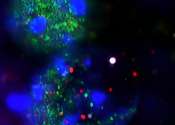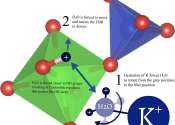Last update:
Medications
Meta-analysis reveals minimal cognitive gains from antipsychotic drugs
A systematic review and network meta-analysis of 68 studies has found no clear evidence that any specific antipsychotic significantly improves cognitive function in patients with schizophrenia spectrum disorders compared ...
12 hours ago
1
48
Medical research
Glucose metabolism drives embryonic development in mice, study reveals
Yale University researchers have discovered that glucose metabolism plays a critical role in guiding the early development of mouse embryos, revealing that specific metabolic pathways regulate essential cell signaling during ...
11 hours ago
0
33
Medical research news
Large study finds prolonged fasting for multiple orthopedic surgeries raises risk of malnutrition, worse outcomes
People who have multiple orthopedic surgeries during the same hospital stay are more likely to suffer malnutrition due to repeated or prolonged fasting, which can slow recovery and increase the risk of death, according to ...
7 hours ago
0
13

Learning without feedback: Neuroscientist helps uncover the influence of unsupervised learning on humans and machines
Imagine a child visiting a farm and seeing sheep and goats for the first time. Their parent points out which is what, helping the child learn to distinguish between the two. But what happens when the child does not have that ...
Oct 18, 2024
0
94

Discovery of how liver flushes cholesterol from body could lead to better cardiovascular disease treatments
A new discovery about how the liver flushes cholesterol from the body could lead to more effective treatments for cardiovascular disease—the leading cause of death worldwide.
Oct 18, 2024
0
37

Study shows that Rett syndrome in females is not just less severe, but different
A new UC Davis MIND Institute study offers critical insights into Rett syndrome, a rare genetic condition that affects mostly girls. The research reveals how this condition affects males and females differently, with symptoms ...
Oct 18, 2024
0
13

Black adults disproportionately affected as glaucoma reaches 4.22 million in the US
A University of Michigan led study finds regional and demographic disparities in glaucoma burden. Results find that 4.22 million U.S. adults had glaucoma in 2022, with 1.49 million living with vision impairment.

In vitro model helps show why breast cancer spreads to bone
Researchers from Tampere University, Finland, and Izmir Institute of Technology, Turkey, have developed an in vitro cancer model to investigate why breast cancer spreads to bone. Their findings hold promise for advancing ...
Oct 18, 2024
0
37

Researchers identify molecular mechanism that could help design future therapies to treat Alzheimer's disease
A research team at the Institute of Neurosciences of the University of Barcelona (UBneuro) has led a study describing a new molecular mechanism that affects RNA processing and alters the process of protein synthesis in the ...
Oct 18, 2024
0
64

Powerful new analyses could improve breast cancer risk assessment on a massive scale
Imagine that you have a history of breast cancer in your family, and you want a better idea of what your personal risk is. You consult your physician, and they recommend that you test to see if you have a genetic variant ...
Oct 18, 2024
0
51

Solving a 50-year-old mystery could lead to neurodegenerative disease treatments
Scientists have gained a deeper understanding of a molecule that regulates lipid levels in the brain. This breakthrough could eventually lead to treatments for diseases like frontotemporal dementia and Alzheimer's disease. ...
Oct 18, 2024
0
29

Innovative surgical technique makes combined face and whole-eye transplantation a reality
An explanation of how an NYU Langone Health surgical team performed the world's first combined face and whole-eye transplantation was presented at the American College of Surgeons (ACS) Clinical Congress 2024 in San Francisco, ...
Oct 18, 2024
0
60

Expanding access to weight-loss drugs could save thousands of lives a year, researchers say
Expanding access to new, highly effective weight-loss medications could prevent more than 40,000 deaths a year in the United States, according to a new study led by researchers at Yale School of Public Health and the University ...
Oct 18, 2024
0
33

Protein discovery could pave the way for improved treatment of premature aging disease
A University of Maryland-led discovery could spur the development of new and improved treatments for Hutchinson-Gilford progeria syndrome (HGPS), a rare genetic disorder with no known cure that causes accelerated aging in ...
Oct 18, 2024
0
5

Genetic mapping study uncovers four main categories of cancer drug resistance mutations
All cancer mutations that cause drug resistance fall into one of four categories. New research has detailed each type, helping to uncover targets for drug development and identify potential effective second-line therapies.
Oct 18, 2024
0
16

Trial analysis shows vitamin D supplementation doesn't cut cardiac risk
Cardiovascular disease (CVD) is the primary cause of death among adults over age 65 years. Seniors are also likely to have low blood levels of Vitamin D, which has been linked to cardiovascular disease. Despite this, many ...
Oct 18, 2024
0
11

New diagnostic approach for bacterial infections shows promise in the clinic
For patients with bacterial infections, the sooner they are treated with the appropriate antibiotics, the better they will fare. Current methods for determining which drugs might work for each patient rely on growing bacteria ...
Oct 18, 2024
0
0

How cfDNA testing can reduce pregnancy risks and lower costs
The much-touted arrival of "precision medicine" promises tailored technologies that help individuals and may also reduce health care costs. New research shows how pregnancy screening can meet both of these objectives, but ...
Oct 18, 2024
0
0

How liver tissue from the International Space Station may transform tissue engineering
An "out-of-this-world" project has the potential to transform the future of tissue engineering and liver transplantation through innovative research conducted aboard the International Space Station (ISS).
Oct 18, 2024
0
15

Listening to music may speed up recovery from surgery, research suggests
Looking for a creative way to quicken your recovery from surgery? The key may be found in listening to music, according to research presented at the American College of Surgeons (ACS) Clinical Congress 2024 in San Francisco, ...
Oct 18, 2024
0
30








































